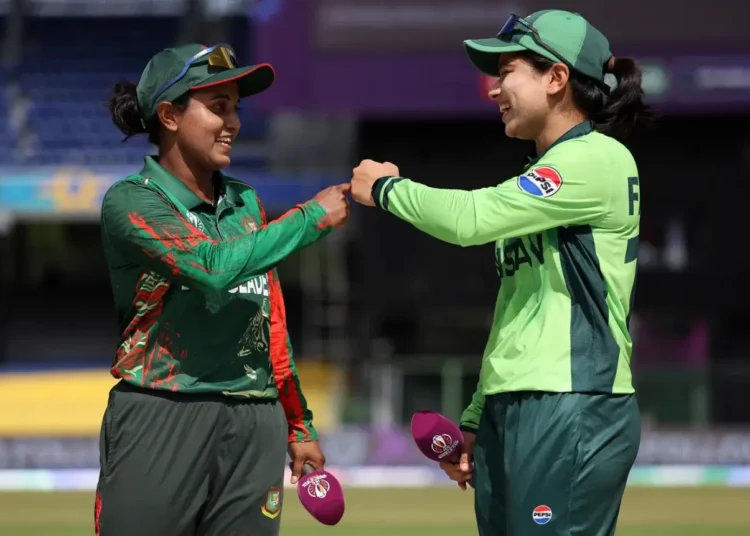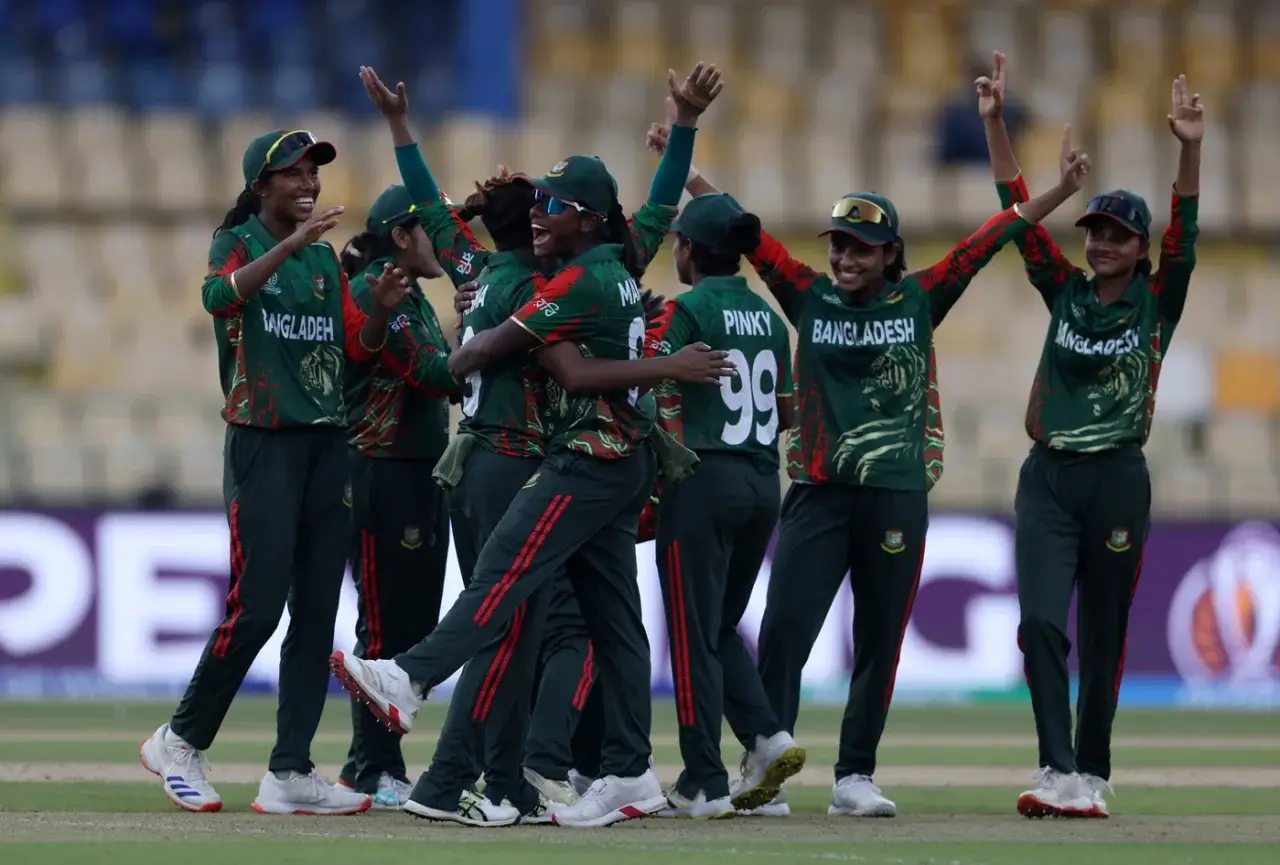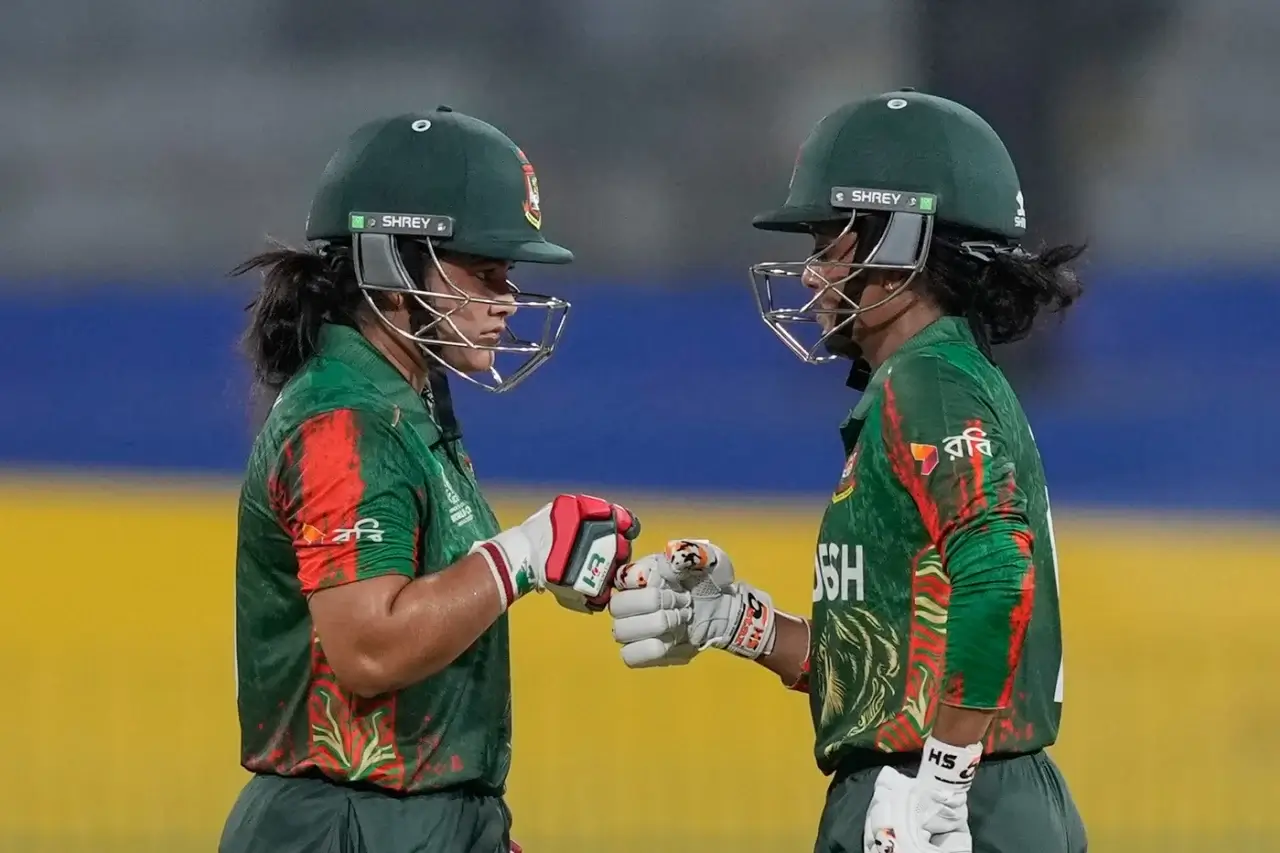Bangladesh women’s team claimed a famous victory over Pakistan in Colombo. The contest promised balance but instead showcased spin dominance and tactical execution. Marufa Akter’s new-ball brilliance instantly shocked Pakistan’s top order. Her double strike in the opening over created lasting damage and shaped the innings.
Bangladesh built on that early breakthrough with relentless spin attack. Five spinners shared responsibility and Pakistan never found control. Shorna Akter starred with 3 wickets for just 5 runs. Fahima Khatun and Rabeya Khan joined in with tight middle overs. Each bowler forced errors and capitalized on Pakistan’s weak stroke play.
Batting proved steady for Bangladesh. Rubya Haider showed composure in her debut fifty. She partnered with Nigar Sultana to chase comfortably. Their partnership absorbed pressure and punished loose bowling. Bangladesh crossed the target with more than 100 balls to spare.
Pakistan will reflect on missed chances and poor batting plans. Only Fatima Sana and Rameen Shamim reached beyond 20 runs. Partnerships collapsed due to shot selection and predictable sweeping. Their World Cup record remains bleak with one win in 22 matches. For historical perspective, fans can revisit the men’s India vs Bangladesh cricket rivalry timeline.
This victory is Bangladesh’s second ever in a Women’s World Cup. It signals growing maturity and tactical depth. For Pakistan, the struggle to balance batting against spin remains a major weakness.
Bangladesh’s Bowling Brilliance Turns the Game
Bangladesh seized control with precise bowling strategies in Colombo. Marufa Akter opened the attack with fire and discipline. Her pace and movement exposed flaws in Pakistan’s technique. Within minutes, Pakistan had lost their most experienced batters cheaply. The momentum shifted and never returned.
The spinners carried that momentum forward. Shorna Akter bowled with sharp turn and variation. Her figures of 3 for 5 broke Pakistan’s resistance. Fahima Khatun built pressure with economical overs that forced rash shots. Rabeya Khan joined with key breakthroughs in the middle overs. Together, they dismantled Pakistan’s fragile batting structure.
Nishita Akter, the youngest player in the tournament, impressed on debut. Her calm control of line and length helped maintain consistency. Nahida Akter added breakthroughs at vital times, further choking Pakistan’s chase. Every bowler had a role and executed it with clarity.
Pakistan’s reliance on sweeping became their downfall. Predictable strokes allowed fielders to anticipate chances. UltraEdge reviews went against them, adding to frustration. By the 39th over, Pakistan collapsed for just 129 runs. Bangladesh had forced errors, dictated tempo, and owned the contest completely.
Why Spin Proved Unstoppable in Colombo?
The Colombo pitch offered early seam movement with moisture from recent rains. Once the surface settled, spin dominated proceedings with ease. Bangladesh’s five-pronged attack gave no room for adjustments. Wrist spin and finger spin combinations tested footwork and patience.
Pakistan attempted heavy sweeping but lacked timing and placement. Singles were hard to rotate due to smart field settings. Every attempt at aggression brought risk and mistakes. Without a strong partnership, batters folded quickly against variation.
Captain Nigar Sultana rotated bowlers with precision and tactical awareness. Her choices ensured Pakistan never faced repetition. With each change, pressure deepened and wickets followed. The plan to rely on spin attack worked perfectly under Colombo’s conditions.
Pakistan’s Batting Collapse and Missed Opportunities
Pakistan’s batting lacked intent and structure throughout their innings. Choosing to bat first backfired almost instantly. Marufa Akter dismissed Omaima Sohail and Sidra Amin in her first over. That double blow created panic in the dressing room. Muneeba Ali tried to settle but edged to point off Nahida. Partnerships collapsed under constant pressure.
Only Rameen Shamim offered resistance with careful stroke play. She strung together a partnership with Muneeba briefly. But once Muneeba fell, Pakistan’s innings unraveled. Aliya Riaz and Sidra Nawaz tried counterattacks but failed to sustain. Reviews went against them, cutting any chance of recovery.
Fatima Sana played a brave hand with late boundaries. Yet she too misread spin and was dismissed lbw. Pakistan’s tail folded quickly with little fight. Nashra Sandhu’s bizarre hit wicket dismissal summed up their day. In total, Pakistan managed just 129 runs in 39 overs.
This performance highlights a worrying trend for Pakistan in global events. Lack of partnerships and over-reliance on individual flashes hurt them. Batters must find stability and better plans against spinners. Without urgent changes, their campaign risks further setbacks.
Lessons Pakistan Must Learn Quickly
Pakistan’s immediate fix is to rethink batting approaches against wrist spin. Sweeps alone cannot counter varied bowling angles and consistent lengths. Footwork must improve to rotate strike and reduce dot-ball pressure. Batters need patience and awareness in early overs.
The middle order should focus on building partnerships rather than flashy boundaries. Singles and doubles must be prioritized to keep the scoreboard moving. Coaches must simulate spin-heavy scenarios in nets to build confidence. Mental strength is also key to recover from collapses.
If Pakistan adapt their batting with discipline, results can change. With bowlers like Fatima Sana and Diana Baig, they have match-winners. But without stronger batting, their efforts will remain wasted. These changes are necessary if Pakistan hope to stay competitive.
Players Who Defined the Contest
Rubya Haider stood tall with her debut half-century. Her calm temperament and timing guided the chase smoothly. She punished poor deliveries and rotated strike with maturity. Haider’s innings showed Bangladesh’s growing batting depth.
Captain Nigar Sultana played an anchoring role as well. She supported Haider with calculated aggression and smart leadership. Together, they ensured Bangladesh avoided collapses. Their partnership of 62 runs sealed the match comfortably.
Marufa Akter was the star with the ball. Her early double strike dismantled Pakistan’s confidence. Shorna Akter added fire with spin, making breakthroughs in clusters. Fahima Khatun and Rabeya Khan backed them with tight overs.
Pakistan’s bright spots were Fatima Sana and Diana Baig. Both bowled with discipline and created early pressure. Sana’s all-around efforts showed her value as captain. But their bowling was undone by a fragile batting unit.
Key Names to Watch Going Forward
Bangladesh’s young stars like Marufa Akter and Shorna Akter will be crucial. Their impact with new ball and spin will shape future matches. Rubya Haider’s consistency can strengthen Bangladesh’s top order. Nigar Sultana’s leadership will remain central to their progress.
For Pakistan, Sidra Amin must rediscover her rhythm quickly. Muneeba Ali has the experience to anchor innings but needs support. Fatima Sana remains their best hope with ball and bat. Diana Baig’s control could still deliver vital wins in the group stage.
Both sides will track debutants and youngsters for long-term plans. Emerging players have already made decisive impacts. The next games will test resilience and adaptability. Teams must react fast to remain competitive in this tournament.
Conclusion
Bangladesh’s second World Cup victory highlighted growth in skills and strategy. Their spin attack suffocated Pakistan’s fragile batting unit. Fielding, discipline, and smart captaincy ensured control at every stage. Batting partnerships from Haider and Sultana sealed the comfortable chase.
Pakistan’s collapse revealed old weaknesses in batting approaches. Lack of partnerships and poor shot choices cost them momentum. Bowlers Sana and Baig impressed but lacked run support. Without batting improvement, Pakistan risk a disappointing campaign again.
Colombo’s conditions rewarded tactical discipline and exposed technical flaws. Bangladesh adapted perfectly and executed plans with precision. Pakistan must regroup quickly if they want to progress further. Each game in this group now holds massive importance.
For Bangladesh, this result fuels belief and strengthens their confidence. Young talents and experienced leaders combined to deliver success. For Pakistan, lessons must be applied swiftly before it’s too late. Fans can expect more drama, intensity, and tactical battles ahead.
Both teams remain in focus as the group stage develops. Bangladesh will aim to build momentum from here. Pakistan will fight to recover pride and keep their hopes alive.







